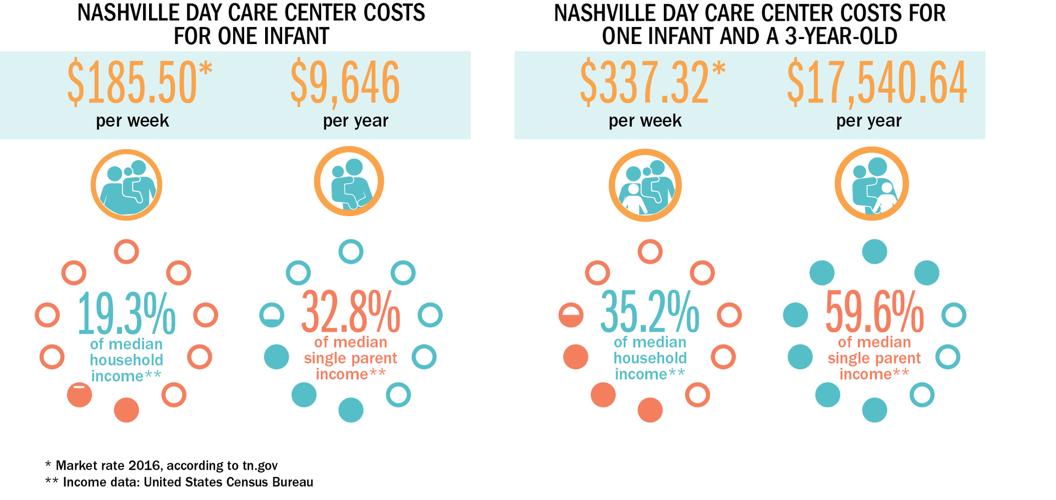
Children are blessings. They’re also very expensive.
According to data collected by the Tennessee Department of Human Services in 2017, the average market rate of infant care in greater Nashville is $185.50 a week. That comes to $9,646 a year, which is 19.3 percent of the median household income in Nashville. For a single parent making the average per capita income of $29,427, infant care takes 32.8 percent of yearly earnings. For a family of three living at the federal poverty line, it’s 47.8 percent.
For a household with two children — say, one infant and one 3-year-old — the market rate is $17,541 per year. That’s about 35 percent of the average household income, and nearly 60 percent for a single parent. For a family of four living at the poverty line, child care for those two children would cost them 72 percent of their income.
With such a high percentage of annual wages going to child care, more and more parents need assistance to afford it, including those who aren’t receiving other government benefits. There are incentives to work full time and pursue higher education to get this help.
“I would say that every parent who calls has a question about the affordability of child care,” says Joyce Bridges, director of the Child Care Resource and Referral Network of Tennessee. “I don’t think it’s just those people who might have difficulty paying for child care. Even those who have a decent income, the care can be almost as much as a mortgage payment, so that’s something they have to consider.”
The Smart Steps payment assistance program was introduced in June 2016 under the Department of Human Services’ Child Care Certificate program, and requires parents to be employed or in school full time to be eligible. Gwen Laaser, director for the child care certificate program, says Smart Steps was established specifically for families who make more than what would normally qualify them for government assistance.
“We have this available for families because child care is so expensive that it will take a large portion of a family’s income,” says Laaser. “In order for them to be able to have the economic independence and to thrive, this system is there to enable that.”
Under Smart Steps, the highest annual income a family of four can make and still be eligible for subsidized costs is $57,660, and that family would pay around $88 per week for two children.

The Child Care Certificate program is the child care component of the Families First program, our state’s branch of the national Temporary Assistance for Needy Families program. Most families enrolled in the certificate program do so through Families First. It serves children ages 6 weeks to 5 years old and subsidizes the cost of child care based on income, family size, how much the parents work, the child’s age and the market rate of child care. Davidson County and 26 other “top tier” counties in Tennessee get a little larger subsidy because of their high population and per capita income.
The Head Start program offers an incentive for parents to further their education and get gainful employment. Parents in the program who are unemployed or underemployed are referred to Metro Action Commission education and job programs and encouraged to use the time their child is in free care to enroll in school or further employment. Even if the family starts making above the poverty line, which is the commission’s goal, the children can stay in Head Start until they’re old enough for kindergarten.
“Imagine a family who is just getting their footing financially,” says Lisa McCrady, special assistant to the executive director at Head Start. “If a lot of their supports were taken, then they could suddenly be vulnerable again.”
Head Start has been providing free preschool for families below the federal poverty line who have children ages 3 to 5 since 1965 — based strictly on income with exceptions for children with certain disabilities. For 2016-17, that line was at $24,300 a year for a family of four in Nashville. The Early Head Start program was introduced in 2010 to serve children ages 6 weeks to 3 years.
Day care centers that offer a sliding scale for tuition are pretty rare, and that’s why Fannie Battle Day Home in East Nashville has such a long wait list. In fact, executive director Melanie Shinbaum hesitated to be interviewed over concern that media attention might make the list grow even longer. In order for their children to be enrolled, parents must be employed or in school full time. The tuition is prorated based on household size and income, and Fannie Battle reports that 85 percent of its families are supported by a single parent. Even with parent payments and subsidies from state funding, Shinbaum says Fannie Battle still fundraises 60 percent of its operating budget to be able to provide the services that it does.
The bulk of the funding for the Child Care Certificate program and the Head Start program comes from the Child Care Development Block Grant, which is then divided into a Child Care and Development Fund for each state. In February, the government authorized $5.8 billion in new discretionary funding for the CCDBG, to be doled out through September 2019.
From a provider’s side, it is expensive to provide care for children, especially for those under the age of 3. Early Head Start spends $12,113 per child, whereas Head Start spends $8,300 per child enrolled.
The referral network’s Bridges says it’s important to note that parents aren’t being overcharged for what they are given. The cost is high to maintain licensing requirements, training requirements and a safe environment, plus toys, food and the proper staff ratios in order for a facility to get three stars, the state of Tennessee’s highest rating for child care center quality.
“We are very aware of the cost of the care,” says Bridges. “On the other side, how much child care professionals earn is not high. To be able to pay the people who take care of the children really what they deserve, how much would that really cost? And it would be cost prohibitive if only the parent were paying for that.”
In 1891, when Fannie Battle Day Home was founded in Nashville, children needed care while their parents went to work so they weren’t left to roam the streets or fend for themselves at home. Child care is not a new need, but with the high costs, new parents often need a bit of help now as well.






